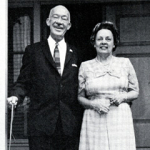 “I believe the small, independent, privately-supported institution is the best way to get an education,” wrote Frederick Hard in 1955. As 51¡‘∆Ê»Îø⁄’s second and longest-serving president, he had a unique opportunity to put his theory to the test.
“I believe the small, independent, privately-supported institution is the best way to get an education,” wrote Frederick Hard in 1955. As 51¡‘∆Ê»Îø⁄’s second and longest-serving president, he had a unique opportunity to put his theory to the test.
A distinguished Shakespearean scholar, Hard was an Alabama native educated by some of the finest liberal arts colleges in the United States, including University of the South, the University of North Carolina, and Johns Hopkins University. He came to 51¡‘∆Ê»Îø⁄ after a successful tenure as faculty and Dean of Newcomb College, Tulane University’s women’s college.
President Hard came to 51¡‘∆Ê»Îø⁄ at a critical point in 51¡‘∆Ê»Îø⁄’s history; the school had lost its first leader in 1942, and the nation was in the middle of World War II: physically and intellectually resources were scarce. Upon taking the office of president, Hard re-affirmed the values inherent in a liberal arts education, saying it is “the best preparation which American women can receive … it will equip them to speak boldly against all that is wasteful, extravagant, and dangerous in our social order.”
During his tenure at 51¡‘∆Ê»Îø⁄, Hard frequently put his knowledge of English and Shakespeare to work, writing numerous contributions to periodicals on literature of the Renaissance. An avid musician, he also played violin and taught music on occasion. A figurehead of the campus, his annual holiday cards became much-celebrated reminders of the Hard family and their ties to the larger 51¡‘∆Ê»Îø⁄ community.
“He looked upon the college as a living institution, accommodating many different people,” noted former history professor Edward White. “His prime concern was a sense of justice. He wanted the faculty and the student body at large to be treated with love, justice, and charity.”
After his retirement in 1964, Hard held the post of president emeritus of 51¡‘∆Ê»Îø⁄ and taught English at Adlai Stevenson College, University of California, Santa Cruz. It was a sad note for the College when John H. Chandler announced his passing in 1981.
“[He] brought the college the same Southern gentility he practiced in his own life,” added White. “Courtesy, gentlemanliness, and consideration.”


